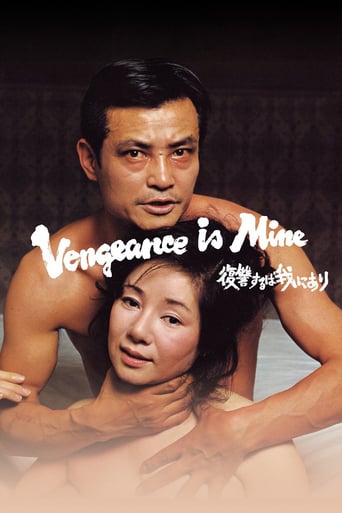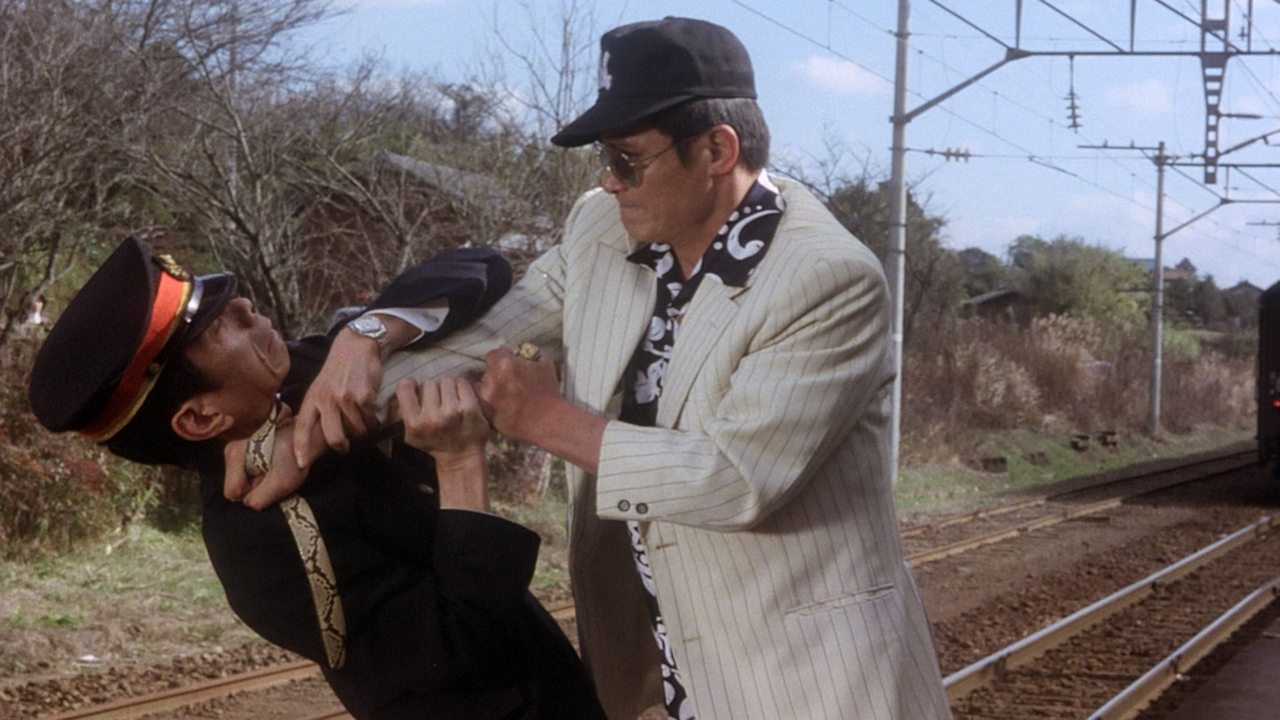Leofwine_draca
VENGEANCE IS MINE is a serial killer film with a different: this Japanese epic is hyper-realistic and reminded me of the sort of classy thriller that Kurosawa would have made in his prime. It has stylistic similarities to Kurosawa's own HIGH & LOW, although the focus this time is on the killer himself rather than the detective investigation.A slightly unusual framing chronology at the outset soon settles into a comfortable routine as the tale is told in flashback for the most part. Ken Ogata plays a fully-rounded character who one day snaps and becomes a murderer, and the film is careful to paint his character in detailed strokes, allowing the viewer to build up a picture of how and why he was eventually driven to murder.It's a psychological study that's packed full of great stuff: subtle characterisation, bursts of sudden and explicit sex and violence, and overall a thorough attention to detail. The cinematography is excellent, bringing to life the shabby working class life of Japan in the late '50s and early '60s, and despite the slow pace and lengthy running time, not a scene seems to be extraneous or wasted. In short, it's a masterwork.
kurosawakira
All the Imamura's I've seen have that one moment. A moment which becomes a cinematic emblem, a token of memory that not only stays in the mind but starts to typify everything. Needless to say, there is a moment like that in this film, and without giving away too much, it involves a transition between scenes and a staircase. The simplest of moments, but the profoundest all the same, where home and the road meet, the lost and the forgotten. It's heartbreakingly beautiful in its impact as it shows the bittersweet death of hope in life that has turned into a vacuum of cessation and a mere series of wandering, swerving accidents.As for Ken Ogata's Iwao, he is a convincing characterization, mundane enough to be completely ordinary, charismatic enough to enable him to transform himself into someone completely unpredictable in his disconnect and for us to walk the distance with him. The genre tends to overemphasize the latter quality – the unique, the mysterious, the alluring. Imamura's way of seeing the world strikes a successful balance between the two extremes. Iwao is, as said, just like anyone else, but still like no one else. He is formed as lacking in perceivable depth. He does, and is almost entirely void of theatrical reaction. This way we invest in and project our preconceptions into the character. Sure, that's the meme in depicting sociopaths, but Imamura is able to use this wisely and without gloating.The Masters of Cinema have released this on Blu-ray (region B). It's a rare miss for them as it has lots of combing, and I think I'll sit this one out and wait for the possible Criterion upgrade (although I prefer the colour grading of the MoC master to that of the Criterion).It seems that IMDb now displays my vote for this title; it appeared after I made a minor edit on the text. I'm not partial to it, since it guides the reader's perception on the writer's opinion often more than the text itself, but there's nothing I can do about it at the moment.
FilmFlaneur
Vengeance Is Mine marked Shôhei Imamura's return to fiction filmmaking after a decade spent working on documentaries. It is based on the true case of Nishiguchi, a Japanese criminal who eluded police for 78 days while committing five murders. The novel from which the screenplay was taken changed the name of the anti-hero to Iwao Enokizu and fictionalized real events. By providing a 'halfway house' between complete invention and real crime reporting, the source thus gave Imamura an ideal stepping-stone back into feature films: retaining the support of documentary inspiration whilst allowing the director to bring his personal vision and structuring to the events unfolding on screen.Modern viewers are long used to a diet of slaughterer cinema, whether it be the Eileen Wuornos depicted in Monster, Albert Fish of The Grey Man, or much less illustrious fodder as Bundy, and Ed Gein. But even after 25 years, Vengeance Is Mine remains one of the few outstanding mass-murderer screen biographies. Told through a series of flashbacks, Imamura's film suggests by its structure both the disassociations of a killer's mind as well as reducing any empathy between creator and lead figure.Thus we see Enokizu's story in five different time periods or points of view: first, during his final arrest and in police custody; then during the police investigation itself; while the killer is committing his crimes and escaping from the law; fourthly, his life before his crimes. Finally there's a scene or two occurring after the execution.By recounting the various stages in a killer's life in non-linear fashion, interesting juxtapositions are possible, all the while dramatic tension between crimes is disrupted. We know that the murderer will have his way and the opening shows us he has been caught. The script's treatment of the material means suspense is removed from events, instead placed at a psychological level, i.e. not on how Enokizu builds to a killing and, presumably, hopes to get away with it, but why he does.But as critic Alex Cox has said: "there are no easy answers" found in a movie much more oblique in its presentation than Hollywood might attempt. Indeed, for the most part, Enokizu's crimes seem to have no overwhelming motive at all (apart from the need for survival money), although deep at the heart of his compulsive behaviour is his bitter relationship with his father. And as Cox further observes, although Vengeance Is Mine headlines a biblical source, ("vengeance is mine, I shall repay sayeth the Lord") it is not absolutely clear in the film on who, or what, Enoziku is wreaking vengeance on.If providence is interested in exacting justice by turn, bringing a necessary come-uppance, its mainly represented by two or three shots over the course of a film, suggestive of a hangman's noose - much more man's law than heavenly retribution. This, while Enokizu is caught and punished, such critical moments (commonplace set pieces in such western killer-centered films such as In Cold Blood) are not even shown. Vengeance Is Mine leaves precise moments of apprehension and execution to our imagination. Instead it shifts focus onto a fractured criminal career of mayhem, familial confusion, and casual sex.Enoziku's father, Shizuo, is a complicated figure who stands as much at the centre of the narrative as does his son. Shamed during the war by refusing to stand up to the requisitioning authorities (a traumatic event witnessed by his son) he later develops a close relationship with Enokizu's wife. Although we presume not consummated, this attraction is a continuing source of great friction. But as Shizuo admits, another tie binds them as: "the blood of the devil runs in my blood too." At the end of the film it is left to Shizuo, a Catholic, to feel the guilt his son never expresses, and undergo excommunication as he arranges to be buried away from his wife in final penance. Critics have argued that Enoziku's murderous career is ultimately inspired by a lack of ability to kill his own father, and this failure is what motivates in turn his rage against others. Shizuo certainly recognises this weakness in murder during a final confrontation between the two, and it represents Enoziku's only regret.With many of its characters drawn from the working classes and a preoccupation with sex, Vengeance Is Mine is a film entirely characteristic of its director, even after a decade long hiatus in his feature career. Like Mizoguichi before him, he often concerned himself with fallen or distressed women in his movies and here they are, represented once again. Imamura had also been a black marketeer in his early years, and was quite at home depicting the underbelly of society, whether it be the sleazy family inn at which Enoziku finds himself, the casual nature of the call-girls brought to its door or the fact that grandmother (herself a killer) watches intimate proceedings through a peep-hole.Enoziku adapts the identity of a university professor during his stay at the inn, and elsewhere a lawyer (filching thereby an amount of money saved for a parole payment). Both outwardly upstanding and hunted at the same time, the criminal hides his culpability beneath a respectable façade. As with the rest of the film, the director's distancing allows no judgement on this state of affairs, merely showing Enoziku's illusion as convincing. Instead it leaves the anti-hero and his actions in a limbo, dependent on our own moral standpoint. Like the murderer's bones, thrown into the sky at the close, matters are suspended between heaven and hell, requiring further investigation.
Der_Schnibbler
Jesus, the things people will say in comments. You'd think this film was some kind of tour de force of violence and depravity. Let me tell you what you are actually getting if you sit down to watch this.Sociopath guy gets arrested, then we have a flashback to his messed up childhood, then fast forward to shortly before he gets arrested, where the majority of the story takes place. During this time, he moves from one place to another to evade police, meets people, scams them, kills them, moves on. When he's not doing that, he is crawling in awkward positions around small indoor spaces.The rest of the time is spent watching characters display entirely inappropriate reactions to the things taking place. For example, the police discuss his crimes with him in the interrogation room without so much as batting an eyelid at his confessions. His ex-wife is in love with the guy's father who is old enough you hardly believe he can get it up.If you can buy all that, and if you think this kind of thing deserves a whopping two and a half hours of your time, enjoy. Otherwise, go see "Henry: Portrait of a Serial Killer."My God, the things people will say here... Look, whoever is in awe of this film is probably some kind of aficionado of Japanese cinema. If you do not fall in that category and are instead someone looking for some entertainment that will keep your interest throughout two hours and twenty minutes, do yourself a favor and leave this film be.


 AD
AD



